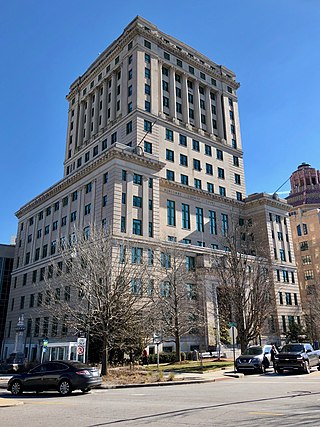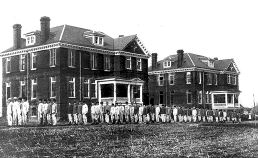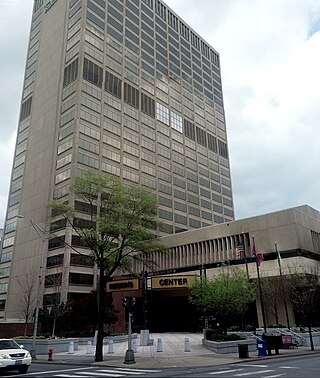
Buncombe County is a county located in the U.S. state of North Carolina. It is classified within Western North Carolina. The 2020 census reported the population was 269,452, making it the 7th-most populous county in North Carolina. Its county seat is Asheville. Buncombe County is part of the Asheville, NC Metropolitan Statistical Area.

Swannanoa is a census-designated place (CDP) in Buncombe County, North Carolina, United States. The population 5,021 at the 2020 census up from 4,576 at the 2010 census. The community is named for the Swannanoa River, which flows through the settlement. It is part of the Asheville Metropolitan Statistical Area.

Butner is a town in Granville County, North Carolina, United States. The population was 8,397 as of the 2020 census. Butner was managed by the state of North Carolina from 1947 through 2007.

Juvenile delinquency, also known as juvenile offending, is the act of participating in unlawful behavior as a minor or individual younger than the statutory age of majority. These acts would otherwise be considered crimes if the individuals committing them were older. The term delinquent usually refers to juvenile delinquency, and is also generalised to refer to a young person who behaves an unacceptable way.

In criminal justice systems, a youth detention center, known as a juvenile detention center (JDC), juvenile detention, juvenile jail, juvenile hall, or more colloquially as juvie/juvy or the Juvey Joint, also sometimes referred to as observation home or remand home is a prison for people under the age of majority, to which they have been sentenced and committed for a period of time, or detained on a short-term basis while awaiting trial or placement in a long-term care program. Juveniles go through a separate court system, the juvenile court, which sentences or commits juveniles to a certain program or facility.

The Juvenile Justice and Delinquency Prevention Act of 1974 (JJDPA) is a United States federal law providing formula grants to states that follow a series of federal protections on the care and treatment of youth in the juvenile justice and criminal justice systems.

The American juvenile justice system is the primary system used to handle minors who are convicted of criminal offenses. The system is composed of a federal and many separate state, territorial, and local jurisdictions, with states and the federal government sharing sovereign police power under the common authority of the United States Constitution. The juvenile justice system intervenes in delinquent behavior through police, court, and correctional involvement, with the goal of rehabilitation. Youth and their guardians can face a variety of consequences including probation, community service, youth court, youth incarceration and alternative schooling. The juvenile justice system, similar to the adult system, operates from a belief that intervening early in delinquent behavior will deter adolescents from engaging in criminal behavior as adults.

Cabarrus Youth Development Center is a juvenile correctional facility of the North Carolina Department of Public Safety located in unincorporated Cabarrus County, North Carolina, near Concord.

Eagle Springs is an unincorporated community in Moore County, North Carolina, United States, situated near the southern terminus of North Carolina Highway 705, on North Carolina Highway 211, west of Elberta, the southern terminus of North Carolina Highway 705. It lies at an elevation of 673 feet. The ZIP Code for Eagle Springs is 27242.
Juvenile delinquency in the United States refers to crimes committed by children or young people, particularly those under the age of eighteen.

The North Carolina Department of Public Safety (NCDPS) is an umbrella agency that carries out many of the state's law enforcement, emergency response and homeland security functions. The department was created in 1977 as the Department of Crime Control and Public Safety. In 2012, the North Carolina Department of Correction and the North Carolina Department of Juvenile Justice and Delinquency Prevention were merged with Crime Control & Public Safety to create the new agency.

The United States incarcerates more of its youth than any other country in the world,, through the juvenile courts and the adult criminal justice system, which reflects the larger trends in incarceration practices in the United States. In 2010, approximately 70,800 juveniles were incarcerated in youth detention facilities alone. As of 2006, approximately 500,000 youth were brought to detention centers in a given year. This data does not reflect juveniles tried as adults. As of 2013, around 40% were incarcerated in privatized, for-profit facilities.
The Missouri Division of Youth Services (DYS) is a state agency of Missouri that operates juvenile correctional facilities. A division of the Missouri Department of Social Services, DYS has its headquarters in Jefferson City.
The Florida Department of Juvenile Justice (FDJJ) is a state agency of Florida that operates juvenile detention centers. Its headquarters are in the Knight Building in Tallahassee.
The Illinois Department of Juvenile Justice (IDJJ) is the code department of the Illinois state government that acts as the state juvenile corrections agency.

The Georgia Department of Juvenile Justice (DJJ) is a state agency of Georgia, United States, headquartered in Avondale Estates, near Decatur and in Greater Atlanta. The agency operates juvenile correctional facilities.

The Tennessee Department of Children's Services (TDCS) is a state agency of Tennessee that operates services for children and youth. It is currently headquartered on the tenth floor of the UBS Tower in Nashville. The current commissioner is Margie Quin, who assumed office on September 1, 2022.
The Massachusetts Department of Youth Services (DYS) is a state agency of Massachusetts. Its administrative office is headquartered in 600 Washington Street, Boston. The agency operates the state's juvenile justice services and facilities for incarcerated of children.
The Kentucky Department of Juvenile Justice (KYDJJ) is a state agency of Kentucky headquartered in unincorporated Franklin County, near Frankfort. The agency operates juvenile correctional facilities.
The Texas Juvenile Justice Department (TJJD) is a state agency in Texas, headquartered in the Central Services Building (CSB) in Austin.












